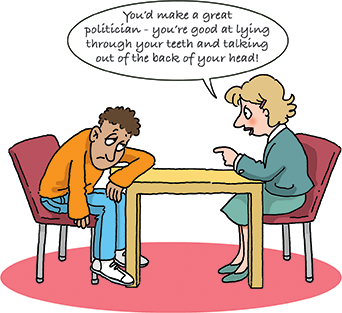2 Politics: a contested concept
So far, you have had a rather broad introduction to politics and its importance, on both a grand and an ordinary scale. You will now be introduced to some of the ways in which those who study politics have defined it. Through an engagement with various definitions of politics, this section of the course will also introduce you to the idea that many concepts in the social sciences are contested, politics included, and will explore the implications of this for studying and engaging in politics.
For writer Ernest Benn, ‘politics is the art of looking for trouble, finding it whether it exists or not, diagnosing it incorrectly and applying the wrong remedy’ (cited in Rodman, 1946). This view of politics is certainly not uncommon. It is probably representative of how many of us have, at one time or another, felt about politics. Economist Milton Friedman’s remark, ‘If you put the federal government in charge of the Sahara Desert, in five years there’d be a shortage of sand’ (Duronio, 2012) expresses a similar sentiment: leave it to politicians, and they will find a way to empty the desert of sand. Politics is a loaded term, one that evokes strong emotional responses from both critics and champions. Still greater contempt is often reserved for those who practise politics for a living. Politicians are often the butt of jokes and subjects of derision. Even Henry Kissinger, himself a political figure loathed by many, had little to say in defence of his profession when he opined that ‘Ninety per cent of the politicians give the other ten per cent a bad reputation’ (Byrne, 1984).
If politics does indeed have a bad name, the first question we might ask is: Why? Those disillusioned with politics would have no shortage of evidence: self-interested, deceitful, corrupt and aloof politicians; incompetent or unresponsive governments; the frequent pettiness and absurdity of political debate in both the government and the media. In recent years, political corruption scandals have shaken the Czech Republic, Greece, Ireland, Italy, France, Spain, Russia and Turkey, to name but a few. The UK has certainly not been immune. According to The Independent’s Jonathan Brown, ‘recent British scandals can compete with the best Europe can offer’ (Brown, 2013).
And that is just Europe; political fraud, corruption and nepotism are so commonplace in many parts of the world that more often than not they are no longer considered ‘scandalous’. Add to this the ineptitude of some politicians (the innumerable ‘Bush-isms’ of former US President George W. Bush come to mind), the petty, at times violent brawls that erupt during parliamentary sessions in many parts of the world and the often uninspiring levels of political debate, and it is no wonder that many have lost faith in politics and politicians, and feel apathetic towards and disenfranchised from the political process. It is no wonder that many feel that the world would be a better place if we could just put an end to politicking.
But is this all that politics is about? Is there more to politics than what makes the headlines, notorious for prioritising the shocking and scandalous? Does politics extend beyond the politicians and parties we often distrust, the halls of government most of us have little access to, the ritual of voting that many of us find increasingly inconsequential?
Politics – and by extension, the actors in political dramas and the stages on which politics is enacted – is far more ubiquitous than we might suspect. Yet the questions of what politics is, who it is done by, where it takes place and how we study it elicit contradictory responses. Rather than providing definitive answers, we will introduce you to different perspectives; it is up to you to decide which you find most compelling.
In the following sections, you will be invited to consider a number of distinct definitions of politics. It is useful to conceptualise these definitions as existing along a spectrum, from narrow to broad understandings of politics. As you read on, you will notice that this spectrum, although useful, will itself come under scrutiny, particularly as we consider whether all of the definitions fall squarely towards the narrow or broad side, or whether some definitions are narrow in certain aspects and broad in others, or indeed could have both narrow and broad variations.
Having considered a number of distinct definitions of politics, we will then reflect on what this might mean for the practice and study of politics. We will do so with the help of a term that has been immensely influential both in the study of politics and in the social sciences and humanities more broadly: ‘essentially contested concept’. The phrase, originally coined by the social and political theorist Walter Bryce Gallie, was popularised by William E. Connolly in his seminal book The Terms of Political Discourse, first published in 1974 (Connolly, 1993). As you will see, the idea that the definitions of concepts – such as the concept of politics in general, but also more specific political concepts like freedom or equality – are disputed, and that two or three incompatible definitions could all be equally legitimate, has implications not just for politics, but for the nature of knowledge in the social sciences and humanities more generally.

